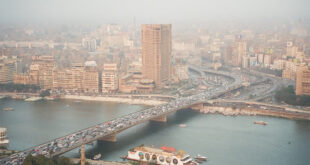Review by Rasha El-Ibiary, University of Newcastle Upon Tyne
Hoskins, Andrew. Televising War: From Vietnam to Iraq. London: Continuum International Publishing Group. 2004. Paperback. 148 pages. ISBN: 0826473067 $35.95.
In discussing obstacles and challenges constraining critical journalism, Andrew Hoskins essentially traces development in policy and techniques of war coverage, from Vietnam to the 1991 Gulf War to the latest US-led invasion of Iraq 2003.
Emphasizing the role of television in constructing collective memory and shaping audience perception of news, Hoskins argues, "Television, and particularly television news, produce a new and apparently reliable stream of historical consciousness of today's events."
Most significant is Hoskins' account of the different conditions that shaped media coverage of 2003 Iraq war, pointing to the role of "immediacy" in constraining accurate and critical journalism, and which resulted in "breaking rumors" rather than "breaking news."
Embedded TV correspondents were effective in delivering the coalition's viewpoint, he writes. The coverage strongly stressed "intense competition" and raised "audience expectations," both "driven by a compulsion for reality television" by the embedded reporters. The embedding of TV reporters and the pressure for immediacy, in effect strangled objective reporting. The "narrow and decontextualized snapshots of the war" were predominantly caused by the "shrinking of the physical distance between the embed and soldier" that was "matched by a shrinking of the critical distance between journalist and the story." Rather than critically reporting on the war, news networks and their embedded correspondents constructed the story, and in many instances became part of the story. "Journalists themselves became contestants in warfare. And news packaged as entertainment provided the requisite celebration of participants."
Unlike the single American perspective that prevailed in 1991, Arab-based satellite channels, however, provided completely different perspectives of the war, which Hoskins claims were also market-driven, and lacked objectivity. Channels like Al Jazeera, Al Arabiya and Abu Dhabi TV featured "journalists possessed with different histories and different motivations, and so structured different templates through which to frame the Iraq war." Objectivity was a mirage. Neither the Arab nor the Western versions of the war can claim to have presented independent reporting. Rather, the audience expectations, and the consequent market forces, made war news more of a commodity, with audiences "increasingly able to consume a version of news that does not challenge their (or their nation's) cultural and political outlook, or, conversely, choose one that does."
Providing an opposite version of the war news to their audience's expectations, Arab media were able at times to challenge US "news management." A key issue for western broadcasters was whether to air footage of captured US POWs, fully shown on Al Jazeera, from the Iraqi TV. Only CBS showed the footage, with faces "blurred," while CNN only showed a still photo from Al Jazeera footage that depicted corpses on the floor. By making the footage available in "the public domain," Al Jazeera apparently provided an excuse, if not an obligation, for the Western channels to show some of the footage. Also, the fact that Al Jazeera broadcast the controversial footage made it "as significant a part of the news story as the actual capture of the POWs."
In Televising War, Hoskins provides a crucial and critical analysis of the televisual war coverage in east and west, questioning their claims to objectivity and truth and posing audience expectations and market forces as the main driving forces of news coverage. This, of course, is nothing new. Most books about media and war have reported the same findings. However, Hoskins makes a significant contribution to our understanding of how technology and governmental policies drive TV's war coverage.
 Arab Media & Society The Arab Media Hub
Arab Media & Society The Arab Media Hub




